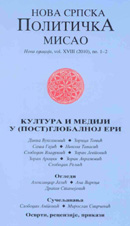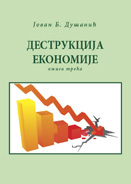| NSPM in English | |||
The Culture of Impunity, NATO Style |
 |
 |
 |
| петак, 18. фебруар 2011. | |
|
(Counterpunch, February 14, 2011)
On January 25, the Council of Europe overwhelmingly endorsed the Report it had commissioned from Swiss Senator Dick Marty on longstanding but officially ignored indications that Kosovo Albanian separatist fighters extracted and sold vital organs from prisoners around the end of the 1999 NATO bombing war that detached Kosovo from Serbia. Specifically implicated was the Drenica section of the “Kosovo Liberation Army” (KLA) led by post-bombing Kosovo’s first and current President, Hashim Thaci. The Council of Europe, whose main function is to defend human rights, called for a proper judicial investigation, notably by the European Union Rule of Law Mission in Kosovo (EULEX) (For a thorough analysis of the Marty Report, see “Criminal Kosovo: America’s Gift to Europe”, by Diana Johnstone, CounterPunch newsletter, Vol. 18, no.1, January 1-15, 2011.) The problem created by the Marty Report is the same as the one that gave rise to it. There is no clear judicial authority willing and able to undertake a criminal investigation of the organ trafficking charges. The charges first surfaced in the 2006 memoir of former Chief ICTY Prosecutor Carla del Ponte, who complained that she was not allowed to pursue investigation of evidence in Albania. It was because of this judicial void that the Council of Europe mandated Senator Marty to make his report, hoping to stimulate some sort of legal procedure. But the problem remains. Most of the alleged crimes took place on the territory of Albania, where the KLA operated bases and prisons, but the Albanian authorities have so far refused to cooperate with investigators. EULEX was sent to Kosovo to try to fill the judicial void left by secession. However, like all the international protectorate structures set up to construct “independent” Kosovo, EULEX is afraid of arousing the wrath of Kosovo Albanians and has great difficulty gaining their cooperation in criminal investigation. Media coverage of the organ trafficking charges implicating Hashim Thaci has been far too muted to build pressure from public opinion on reluctant Western governments to take the issue to court. Human Rights Watch has called for an independent European prosecutor to pursue the case, but there has been no audible response from the governments concerned. Mr. Marty’s expressed fear that his report will remain a “dead letter” seems quite plausible. Even as the Marty Report appears fated to join the Goldstone Report on Gaza in the limbo of good intentions, the counterattack was launched. Oddly, the London Review of Books chose to publish a five-page review of the Marty Report by someone with a strong vested interest in discrediting it: none other than Geoffrey Nice, who as assistant prosecutor at the International Criminal Tribunal for former Yugoslavia (ICTY) in The Hague, led the prosecution of Yugoslav president Slobodan Milosevic. Nice’s only real achievement in the five-year-long trial was to outlive both the presiding judge and the defendant. The monstrous dimensions of the prosecution, aimed at blaming Milosevic for virtually all the woes of the complex civil wars that tore apart Yugoslavia in the 1990s, succeeded in sending Milosevic to his grave before he could present his defense, thus sparing the three judges the task of finding excuses to convict him, as they were hired to do. The LRB review gave Sir Geoffrey (he was knighted in 2007 for his services) the opportunity to rehash the ICTY prosecution version of NATO’s Kosovo war (the “objective was to forestall a humanitarian catastrophe”) complete with the standard exaggerated figures (“at least 10,000 Kosovo Albanians killed”) and crucial omissions (Hashim Thaci “was chosen to go to Rambouillet in preferance to the Kosovan president, Ibrahim Rugova” – without saying by whom he was chosen, namely the U.S. State Department). Nice’s main diversionary tactic was to center his attack on an unidentified “witness K144”. He titled his review “Who is K144?” and went on to answer the question by claiming that K144 was both the basis for the Marty Report accusations and non-existent creation of Serbian media propaganda. A hasty reader might overlook the parenthetical element in the following sentence: “Stories in the Serbian press suggest that many of these allegations came from a witness known as K144, although del Ponte never refers to this source in her book (and nor does Marty, directly).” In reality, there is no “witness K144” mentioned in the Marty Report. Nice’s citations from the Serbian press do not correspond to the Marty Report. The Nice article was immediately echoed and amplified by an article in The Wall Street Journal, which enjoys a larger and more American audience. Under the title “Smearing Hashim Thaci: Are the organ-harvesting allegations part of a media campaign against Kosovo?” (conclusion: yes) British journalist and Member of Parliament Denis MacShane gave a rave review of Nice’s review. “Most troublesome, according to Mr. Nice, is that Mr. Marty’s narrative implicitly depends on an anonymous witness, ‘K144’, who Belgrade says has provided evidence of these atrocities, but who most likely does not exist.” Denis MacShane is a prize attack dog from the kennel of Tony Blair’s poodle imperialism. He is a member of the Henry Jackson Society, a gathering of warmongers whose model is the “Senator from Boeing”, Henry “Scoop” Jackson, who in the 1970s, with the aid of the Richard Perle, championed aggressive anti-Soviet policies under a supposedly liberal banner. MacShane’s claim to be “on the left” seems to rest almost exclusively on his championing of “the only democracy in the Middle East”, which allows him to make up for the shortage of communist threats with Islamic terrorism. His “European Institute for the Study of Contemporary Antisemitism” issued a 2009 report which undertook to define which kinds of criticism of Israel constitute anti-Semitism. These included describing the state of Israel as a racist endeavor and comparing contemporary Israeli policy to that of the Nazis. He is on the board of “Just Journalism” whose aim is to oversee UK media reports on Israel. Mr. MacShane was Labour Minister for the Balkans and then for Europe, but was suspended from the Labour Party last October 14 pending investigation of expense account padding. He reportedly became the first British MP to be reported to the police by the Parliamentary Commissioner for Standards concerning his claims on taxpayer-funded office expenses. MacShane’s claims over seven years totaled about £125,000, including nearly £20,000 a year for an office located in his garage, eight laptop computers in three years and over a dozen bills for “research and translation” by an elusive “European Policy Institute” which turned out to mean, basically, his brother Edmund Matyjaszek (for his professional life, MacShane dropped his father’s Polish name for his mother’s Irish name surname). He has also been involved in numerous minor scandals involving distortion of facts. None of this seems to have harmed his self-confidence or his career, which includes regular essays for Newsweek. From his writings one can gather that the only Muslims he really trusts are the ones in former Yugoslavia. Aside from the K144 diversion, the Nice-MacShane attack on the Marty Report zeroes in on two factors that to readers unfamiliar with the case may look like serious weakness. The report, they stress, gives no names of victims and no names of witnesses. The explanation for this is simple. There are indeed lists of potential victims: missing Serbs and ethnic Albanians who are presumed dead after being taken prisoner by the KLA. Without material evidence, it is nearly impossible to ascertain the precise fate of missing persons over ten years ago in a country, Albania, where local authorities have refused to cooperate and have had ample time to dispose of evidence. As for the names of witnesses, Mr. Marty refuses to disclose them except to serious judicial authorities with a witness protection program. This caution is absolutely necessary given the record of witness intimidation and even murder, notably in the case of Thaci’s rival in the KLA hierarchy, clan leader Ramush Haradinaj. Sir Geoffrey refers to this politely as “accusations of witness tampering”. Geoffrey Nice concludes his review in the LRB by conceding that the allegations against Thaci need to be dealt with, simply because they make a bad impression. Mr. Nice compares Thaci to the West’s man in Montenegro, Milo Djukanovic, accused by Italian authorities of large-scale cigarette smuggling. “Montenegro, like Kosovo, can readily be trashed as a criminal state; and also like Kosovo, it seeks membership of the EU. Djukanovic has just announced that he will stand down and cease to hold political office. This, some say, is intended to ease Montenegro’s entry into organizations that are prepared to negotiate with the likes of Djukanovic or Thaci when their states are emerging from conflict but want afterwards to deal with someone less compromised. Thaci might well have to follow the same path as Djukanovic if the current rumors continue to circulate.” Taking into account the habitual understatement employed by Geoffrey Nice concerning the wrongdoings of “our side”, this can be read as acknowledgement that both NATO protégés are crooks to some degree or other, who were useful in wresting their lands away from the Serbs, but now had best step back to make way for more presentable puppets. Being prosecuted for those wrongdoings, whatever they may be, is, however, out of the question. Human rights campaigners in the self-righteous Western democracies are intransigent when it comes to ending what they call “the culture of impunity” so long as it involves, say, Africa. But their own impunity and that of their clients seems more secure than ever. Diana Johnstoneis the author ofFools Crusade: Yugoslavia, NATO and Western Delusions.She can be reached at Ова адреса ел.поште заштићена је од спам напада, треба омогућити ЈаваСкрипт да бисте је видели |
Од истог аутора
- The Good Intentions That Pave the Road to War
- The Yugoslav wars of disintegration: Graveyard Humor in Belgrade
- Weep Not for Strauss-Kahn
- Why are we making war against Libya - Real and False Reasons
- Libya: Is This Kosovo All Over Again?
- Criminal Kosovo: America’s Gift to Europe
- Richard Holbrooke, 1941-2010, Opportunist Extraordinary
- Encircling Russia, Targeting China
- Nice Guys Finish Last
- Serbia Surrenders to the EU
- Breaking Yugoslavia
- NATO's Kosovo kolony
Остали чланци у рубрици
- Playing With Fire in Ukraine
- Kosovo as a res extra commercium and the alchemy of colonization
- The Balkans XX years after NATO aggression: the case of the Republic of Srpska – past, present and future
- Из архиве - Remarks Before the Foreign Affairs Committee of the European Parliament
- Dysfunction in the Balkans - Can the Post-Yugoslav Settlement Survive?
- Serbia’s latest would-be savior is a modernizer, a strongman - or both
- Why the Ukraine Crisis Is the West’s Fault
- The Ghosts of World War I Circle over Ukraine
- Nato's action plan in Ukraine is right out of Dr Strangelove
- Why Yanukovych Said No to Europe

.jpg)








 Coverup of the Kosovo Mafia: The Culture of Impunity, NATO Style
Coverup of the Kosovo Mafia: The Culture of Impunity, NATO Style











